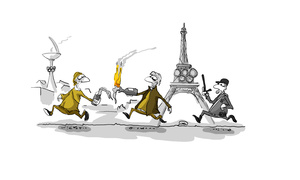CZEXPATS Interview: Karel Janovický, music composer and former director of the BBC's Czechoslovak Service
CZEXPATS Interview: Karel Janovický, music composer and former director of the BBC's Czechoslovak Service
08.11.2021 / 19:15 | Aktualizováno: 08.11.2021 / 19:31
There are many great personalities and inspiring stories among Czech expats living in the United Kingdom. This time, we are bringing you our CZEXPATS Interview with Karel Janovický, with real name Bohuslav Šimsa, music composer and former director of the BBC's Czechoslovak section.
Good morning, Mr Janovický, it is our great honor to have you in our CZEXPATS Interviews project. You came into exile in Great Britain at the age of 20 in 1950, after you fled Czechoslovakia following the communist coup in February 1948. Was Britain always your dream country, or did you end up here rather by chance?
I escaped from Czechoslovakia in mid October 1949 as part of a hurried departure of my future father-in-law, the economist and social democratic politician Prof. Karel Maiwald, and his family. He had reasons to suspect that he was to be persecuted by the new communist regime. As his daughter Sylva and I were in love, he offered to include me, promising my father to look after me in exile as his own son. We then all spent over a year in refugee camps in Germany where Sylva and I married in May 1950 in Nuremburg. Prof. Maiwald got a research job at Cambridge University and I, having sent some of my compositions to the Surrey College of Music in Ewell, south of London, obtained a place and a small bursary there helped by one of the College’s professors, the then well-known Czech violinist Jan Šedivka.
It was certainly not easy for such a young person in a new foreign country. What were your beginnings in Britain and how did the British look at you, given what was happening in Czechoslovakia at that time?
The College had been founded in the post-war period for a specific purpose: it gave demobilised teachers a chance to add music to their qualifications, since there was a great music teacher shortage in the country. I found myself surrounded by mature, experienced and highly motivated students who were friendly and genuinely interested in music, including Czech music. But among the general public I did a few times come across people who in conversation puzzled me by asking why I had wanted to leave my wonderful country which was building socialism. Some even suspected I might be on the run from justice!
You had been a long-time employee of the BBC, for ten years, you had even led its Czechoslovak section. How did you come around this job and what do you value the most about it in retrospect?
As a Czech expatriate in London I was gradually drawn into the activities of the Czechoslovak section of the BBC’s World Service by voicing programmes and reporting on a freelance basis, eventually joining as a regular member of staff. I remember my years at the BBC for the happy workplace atmosphere among colleagues, all of whom keenly followed the developments in the world that promised – and eventually delivered – a return to freedom in our native countries, Czech and Slovak.
In Czechoslovakia and the Czech Republic, we have always been very proud of our music. You yourself have largely contributed to the spread of its name in the UK. What was its position in Britain when you came here and it was difficult to "teach" the British to accept and respect Czech music?
Czech music in Britain is closely linked to the name Dvořák thanks to the composer’s own history of visits, compositions and appraisal in this country. I myself, as a Czech and a musician whose father had been an opera singer, was soon drawn into coaching singers and choirs in the language of works not just of Dvořák but also of Janáček, Smetana, Martinů and others, and had soon learned how important for the appreciation of the music was not just the phonetics but also the music’s phrasing and expression – the ‘making‘ of music rather than merely its ‘interpretation‘ (to use a trendy 20th century word).
How do the Brits view Czech music today? Is it well known in today’s Britain? And which Czech authors (apart from you, of course) and of what genres are popular here today?
Since roughly the late 19h century a composer’s origin has been the first thing people ask when choosing music to listen to and enjoy. Countries have been presumed to produce their own special ‘schools‘ of musicians. French composers have been supposed to write symphonies differently than, say, Finnish composers. In the old days it did not seem to trouble Italian opera fans that Mysliveček (18th century) was a Czech. His operas were still genuine hits in Italy. Czech composers of classical music continue to be well liked in Britain, especially Dvořák, but as to popular genres the taste has been somewhat reversed: English pop music is all the rage in the Czech Republic!
What does the Czech music community in Britain it actually look like? Can we find a lot of Czech musicians here who manage to break though and succeed? And are young Czech musicians even interested in pursuing their careers in Great Britain
Czech musicians still draw on the centuries old legacy of active music-making among all the strata of the country’s society. Now that the country has been free for over three decades Czech classical musicians travel the world and play, conduct and teach.
Nowadays, you are already enjoying your well-deserved retirement. Are you still composing and what kind of musing are you listening to today?
I still compose and my music is performed in my home country: during this year’s (the 32nd) festival Dny soudobé hudby (Days of Contemporary Music) run by the Society of Czech Composers my new Sonata for Violin and Piano will be played by Jana Vonášková Nováková (vn) and Petr Novák (pno) on Nov.22 at the Kaiserštejn Palace in Prague. As to what I happen to be listening to just now is an enjoyable new CD on the ArcoDiva label by the notable Czech pianist Tomáš Víšek of Dvořák’s complete piano works, some of them – incredibly enough - never recorded before.
Poslední zprávy z rubriky Ze světa:
Přečtěte si také:
Prezentace
25.07.2024 Zbytek roku bude zajímavý jak na trzích, tak i v
19.07.2024 Malý háj: Ideální bydlení v nové čtvrti Prahy 10
Okénko investora

Olívia Lacenová, Wonderinterest Trading Ltd.

Ali Daylami, BITmarkets

Petr Lajsek, Purple Trading
Nejhorší scénář pro pohonné hmoty? Kolik budeme platit v srpnu?

Pim Brands, Ronda Invest

Miroslav Novák, AKCENTA

Štěpán Křeček, BHS

Jakub Petruška, Zlaťáky.cz
Zlato se opět vyhouplo přes úroveň 2 400 USD / Oz. Letní dovolenou neplánuje

Jiří Cimpel, Cimpel & Partneři

